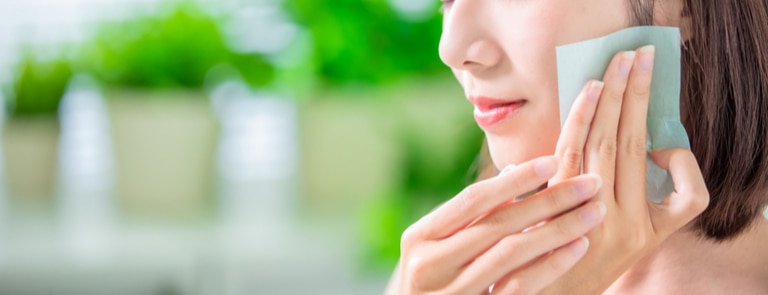15% off £40
Code:QUICK
Chamomile oil: Uses and benefits

What can chamomile oil be used for and what are the benefits of using this essential oil? Check out this article for a complete guide to chamomile essential oil.
Chamomile – most of us associate this daisy-looking ingredient with tea, but it’s available in essential oil form too. Chamomile oil comes from the flowers of the chamomile plant, which actually happens to be related to daisies (hence the visual similarities) and is native South and West Europe and North America.1
Chamomile plants are available in two different varieties. There’s the Roman Chamomile plant (which is also known as English Chamomile)2 and the German chamomile plant. Both plants look largely the same, but it actually happens to be the German variation that contains more of the active ingredients, azulene and chamazulene,3 which are responsible for giving chamomile oil a blue tinge.4
How is it made?
As with most essential oils, chamomile oil is extracted from chamomile plant flowers, using a process known as steam distillation. The Roman chamomile reportedly yields around 1.7 % of chamomile extract from fresh flowers and German chamomile yields between 0.2 and 0.4 %.5
How long have people been using chamomile oil for?
The use of chamomile oil goes back a long way. In fact, it’s reportedly one of the most ancient medicinal herbs known to mankind.6 Its history can be traced right back to the time of the Ancient Egyptians, who dedicated it to their Gods because of its curing properties and used it fight fever. Meanwhile, the Romans used it to make medicines, drinks and incense.7
During the Middle Ages, the Chamomile plant was scattered on the floor at public gatherings. This was so that its sweet, crisp and fruity fragrance would be released when people stepped on it.8
Chamomile essential oil uses
There’s so much you can do with chamomile oil. You can:9
- Spray it - Create a mixture that contains 10 to 15 drops of chamomile oil per ounce of water, pour it into a spray bottle and spritz away!
- Diffuse it - Place some drops in a diffuser and let the crisp aroma freshen up the air.
- Massage it - Dilute 5 drops of chamomile oil with 10ml of Miaroma base oil and gently massage into the skin.10
- Bathe in it - Run a warm bath and add 4 to 6 drops of chamomile oil. Then relax in the bath for at least 10 minutes to allow the aroma to work.11
- Inhale it - Directly from the bottle or sprinkle a couple of drops of it on to a cloth or tissue and gently breathe it in.
- Apply it - Add 1 to 2 drops to your body lotion or moisturiser and rub the mixture into your skin. Alternatively, make a chamomile compress by soaking a cloth or towel in warm water and then adding 1 to 2 drops of diluted oil to it before applying.
Chamomile oil benefits
Chamomile oil is thought to have calming and antioxidant properties.12 It may also have lots of benefits to using it, including these five:
- Address skin concerns – due to its anti-inflammatory properties, chamomile essential oil can help calm skin inflammation and redness, making it potentially useful for blemishes.13
- Promotes sleep – chamomile has long been linked with helping improve sleep quality. One study of 60 people, who were asked to take chamomile twice a day, found that their sleep quality had significantly improved by the end of the research.14
- Alleviate anxiety – research has found that chamomile oil helps alleviate anxiety by acting as a mild sedative due to the compound alpha-pinene interacting with the brain’s neurotransmitters.15
How to use it safely
Always do a patch test to it make sure it doesn’t irritate your skin and always dilute it first with a carrier oil before putting it on your skin. Make sure you follow the manufacturer’s guidelines on how to use it.16
Some interesting facts about chamomile/chamomile oil
- Chamomile goes by lots of different names - Chamomile (or Camomile), Roman chamomile, English chamomile, Garden chamomile, ground apple, low chamomile, mother's daisy, whig plant, to name but a few…17
- Chamomile means ‘apple of the ground’ in Greek18
- Chamomile oil is a great hair moisturiser, helping retain hair moisture and strengthen hair from within19
- Chamazulene is an anti-inflammatory that’s only found in chamomile essential oil20
- Because it’s so gentle, chamomile essential oil is ideal for sensitive skin21
Related Articles
Shop by wellness goal
Sign up for exclusive offers
Plus, get expert advice to support your health & wellness straight to your inbox when you sign up to Holland & Barrett emails.
Read our
privacy policy













